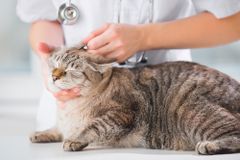Veterinarian Explains Feline Viruses & How to Protect Your Cat

Feline leukemia virus (FeLV) and feline immunodeficiency virus (FIV) are two of the most feared infectious diseases that can affect your cat. As retroviruses, these microscopic organisms alter the genetic material of your cat’s healthy cells, turning them into virus generators. As explained by the expert veterinarian at Dr. Robin’s Housecall Veterinary Services in Denver, CO, the entire process takes time, and a cat may be infected for years before becoming ill. Below, they describe how the viruses take effect and how you can protect your cat.
A Veterinarian’s Guide to FeLV & FIV
How Do Cats Get Them?
Both viruses are typically transmitted through bite wounds. However, FIV uses saliva as its primary method of transportation, while FeLV may be shed through saliva, urine, nasal secretions, feces, and even milk. This means that different populations of cats are at different risk levels. For instance, an FIV-positive cat is more likely to infect others if it gets into a lot of fights, while kittens are most susceptible to FeLV as they are commonly groomed by their mother and rely on her milk.
What Happens When They’re Infected?
 Once a cat is infected, the disease progression can be unpredictable. The feline may experience bouts of illness or become progressively more ill over time. In later stages, symptoms may be more common and obvious. For example, FeLV symptoms typically include anemia, intestinal disease, reproductive problems, poor healing, and gum inflammation. Symptoms of FIV, on the other hand, include low white blood cell count, diarrhea, weight loss, and seizures.
Once a cat is infected, the disease progression can be unpredictable. The feline may experience bouts of illness or become progressively more ill over time. In later stages, symptoms may be more common and obvious. For example, FeLV symptoms typically include anemia, intestinal disease, reproductive problems, poor healing, and gum inflammation. Symptoms of FIV, on the other hand, include low white blood cell count, diarrhea, weight loss, and seizures.
How Are They Treated?
While no treatment exists for either of these conditions, vaccinations do. Vaccinate your kitten for FeLV and FIV around 8 or 9 weeks with a booster a few weeks later. If your cat does contract either virus, the symptoms can be relieved with the help of medication. It’s important to remember that, despite an infection, a cat can still experience long and happy periods of good health. Plus, with annual vet visits, regular screening, and behavior monitoring these diseases can be caught in the early stages.
Protect your cat from these infectious diseases by calling the expert veterinarian at Dr. Robin’s Housecall Veterinary Services. With more than 12 years of experience, this mobile vet will come to you, so your pet can be comfortable during the exam and treatment. To learn about their services, such as dog and cat vaccinations, call (970) 217-1260. For more information about how their services have helped anxious pets, visit their website. You can also like them on Facebook for the latest updates.
About the Business
Have a question? Ask the experts!
Send your question

